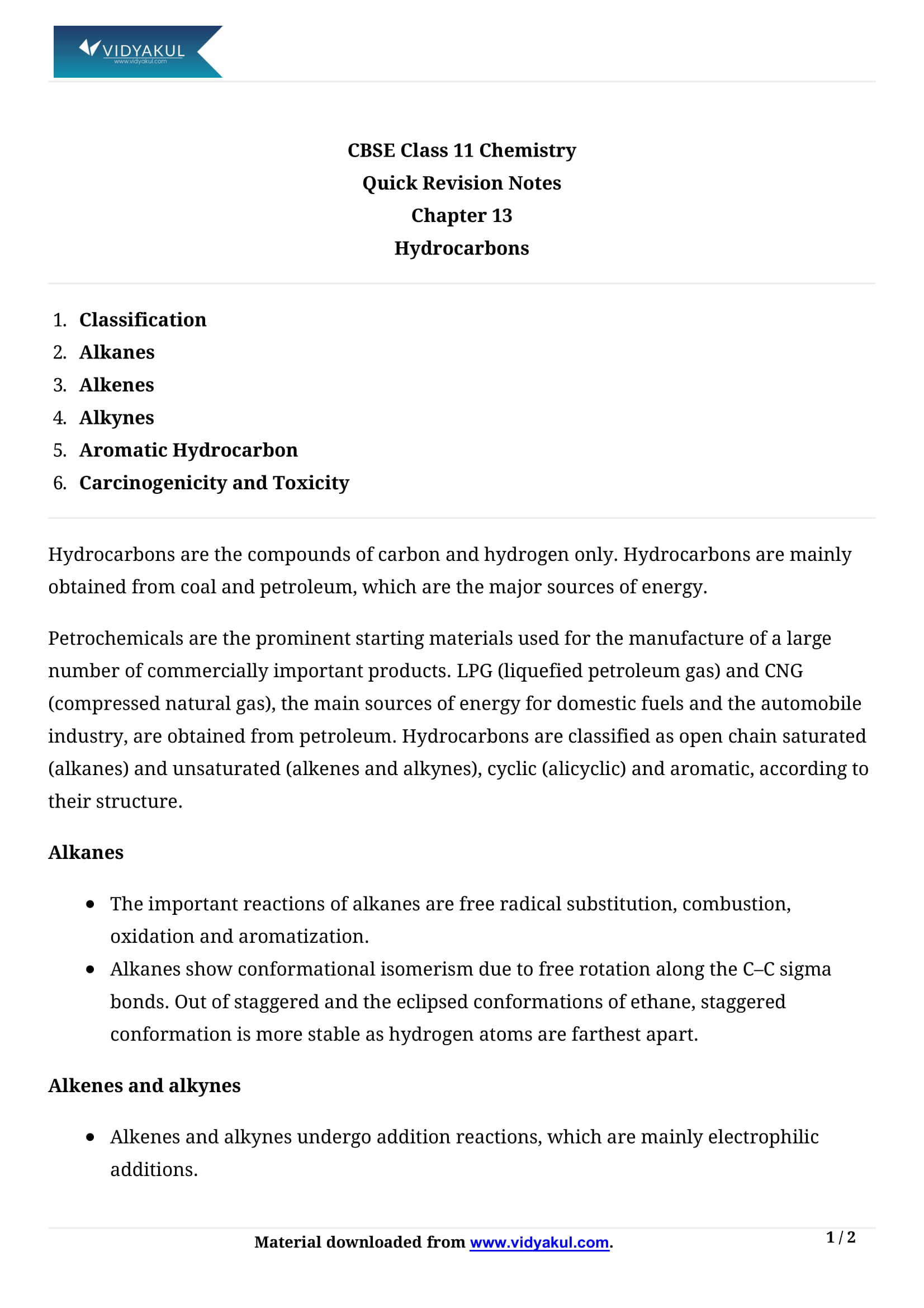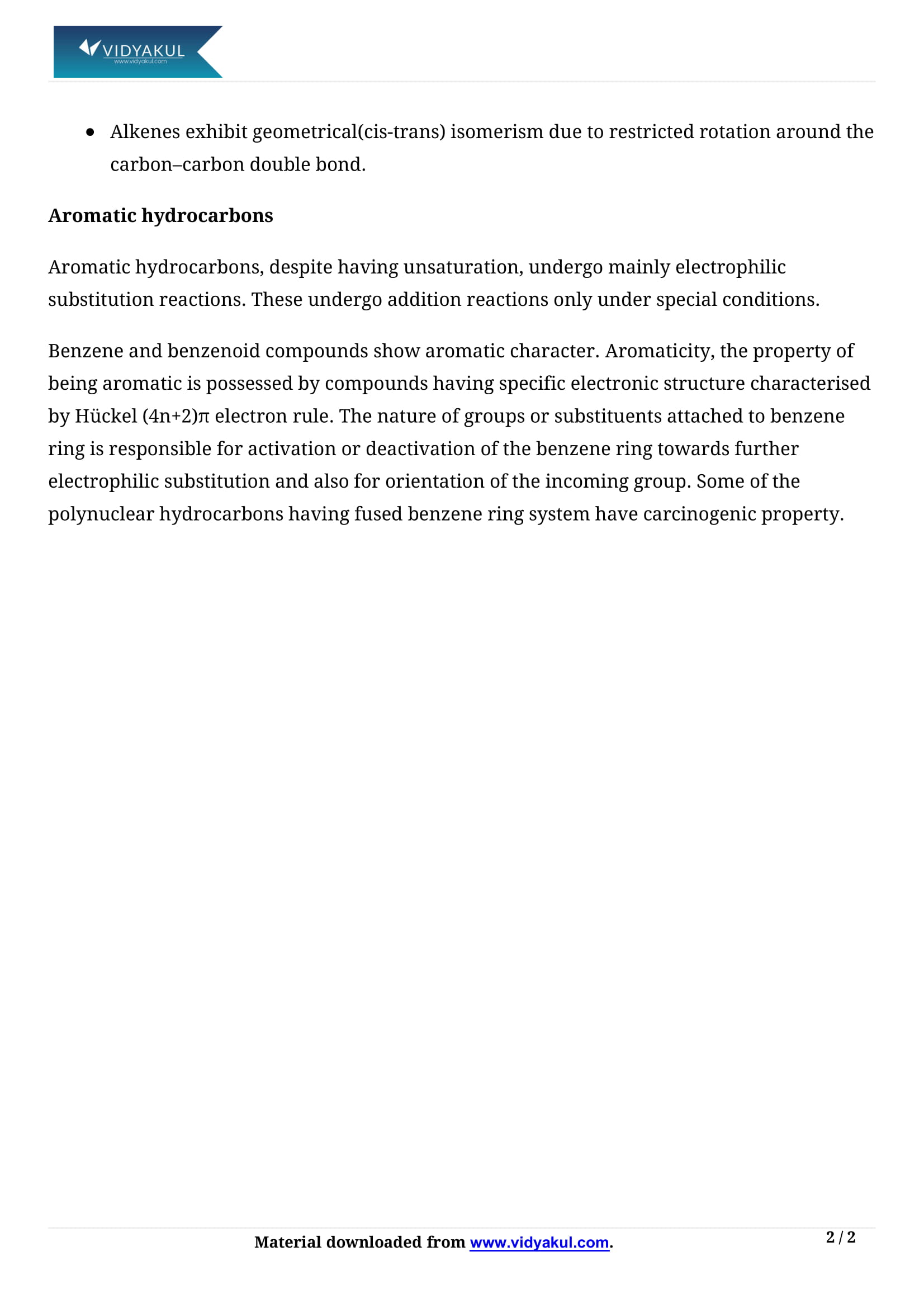Hydrocarbons Class 11 Notes

Chapter 13 Hydrocarbons
The compounds consisting of hydrogen and carbon only are called hydrocarbons. They are obtained from major sources of energy like petroleum and coal. Compressed natural gas (CNG) and liquefied petroleum gas (LPG) are the primary sources of energy for the automobile industry, and domestic fuel is obtained from petroleum.
All the NCERT notes provided in this article are solved by a team of academic experts at Vidyakul. Students can also get a better understanding of the marking scheme as well as the exam pattern followed by the CBSE board. NCERT notes will help students in their final exam preparation as well as different entrance examinations like JEE Main and NEET. Detailed and step-by-step explanations have been given for all of the NCERT notes. Continue reading to know more.
CBSE 11th CHEMISTRY CH-12
Points to Remember
Open chain saturated – Alkanes
Unsaturated – Unsaturated hydrocarbons are defined as the hydrocarbons in which the carbon atoms are bonded to each other with two or three covalent bonds and also have the tendency to obtain more hydrogen atoms. Example alkynes and alkenes.
Cyclic – alicyclic
Aromatic – These hydrocarbons are defined as the cyclic hydrocarbons with alternate C-C and C=C as well as, are similar to the benzene ring in characters.
The major reactions of alkanes are oxidation, combustion, aromatization, and free radical substitution. Alkenes and alkynes undertake addition reaction, which is mainly electrophilic addition. Aromatic hydrocarbons mainly undergo electrophilic substitution reaction. They experience addition reactions only under exceptional conditions.
Topics and Sub-topics
To make learning more fun and easier, CBSE Revision Notes for Class 11 Chemistry Chapter 13 Hydrocarbons is available on the Vidyakul for free download. Students can also refer to these PDF notes, which contain detailed explanations of all the important topics in the chapter. Using these PDF notes will help students understand each topic well and pass the exam with excellence.
When talking about hydrocarbons in chemistry, we can interpret them as organic compounds consisting of the elements hydrogen and carbon. However, when we study this topic in 11th grade, found in CBSE chapter 13 book, we have to learn various things like classification of hydrocarbons, alkenes, alkanes, alkynes, toxicity and carcinogenicity , and understand equations, solve various problems, and more.
Before you go to NCERT notes, let’s see the list of topics that you are going to study in this chapter:
Frequently Asked Questions
Which the longest hydrocarbon chain?
Palytoxin and maitotoxin are believed to have the longest carbon chains in nature.
What are the types of hydrocarbons?
The four main categories of hydrocarbons: Alkanes, Alkenes, Alkynes and Aromatic hydrocarbons.
What are the uses of ‘Cyclic hydrocarbons’?
1. Solvent/chemical raw material 2. Manufacture of petroleum products
Practice Questions
Benzene contains three double bonds and is extraordinarily stable. Why?
How will you convert the hexane into benzene?
Write chemical equations for the combustion reaction of Toluene and Butane.
Open chain saturated – Alkanes
Unsaturated – Unsaturated hydrocarbons are defined as the hydrocarbons in which the carbon atoms are bonded to each other with two or three covalent bonds and also have the tendency to obtain more hydrogen atoms. Example alkynes and alkenes.
Cyclic – alicyclic
Aromatic – These hydrocarbons are defined as the cyclic hydrocarbons with alternate C-C and C=C as well as, are similar to the benzene ring in characters.
The major reactions of alkanes are oxidation, combustion, aromatization, and free radical substitution. Alkenes and alkynes undertake addition reaction, which is mainly electrophilic addition. Aromatic hydrocarbons mainly undergo electrophilic substitution reaction. They experience addition reactions only under exceptional conditions.
Which the longest hydrocarbon chain?
What are the types of hydrocarbons?
What are the uses of ‘Cyclic hydrocarbons’?
Benzene contains three double bonds and is extraordinarily stable. Why?
How will you convert the hexane into benzene?
Write chemical equations for the combustion reaction of Toluene and Butane.
Learn more about the same in Hydrocarbons Class 11 Notes pdf.
Download this solution for FREE Download this PDF





